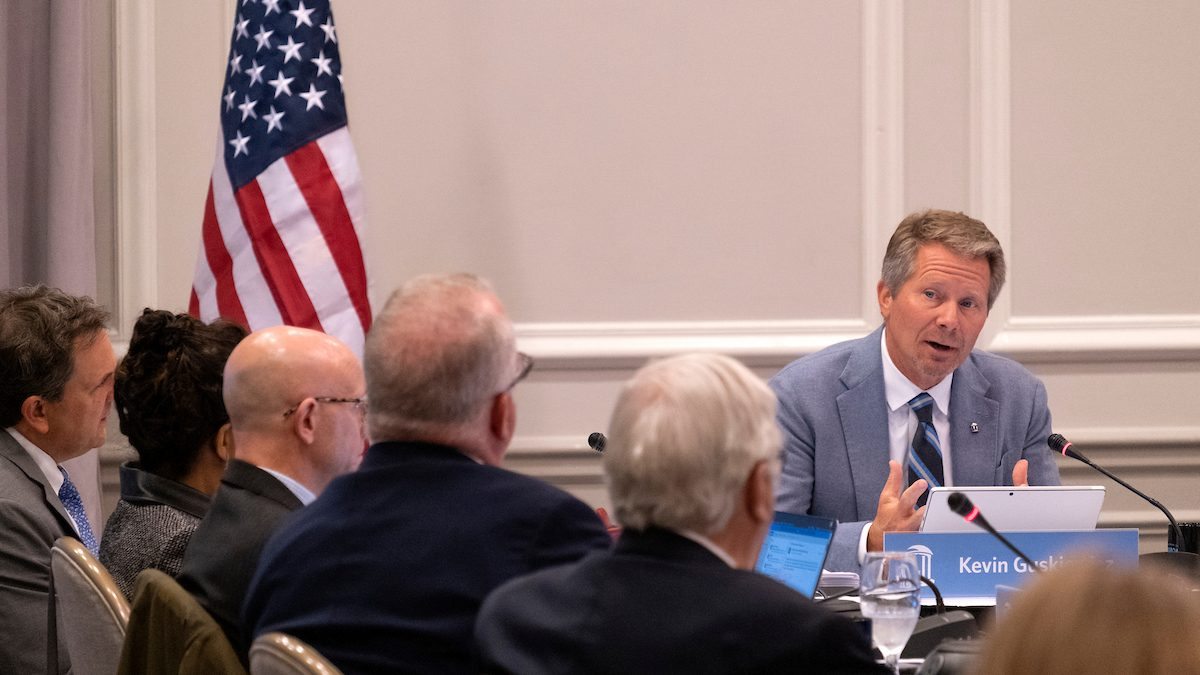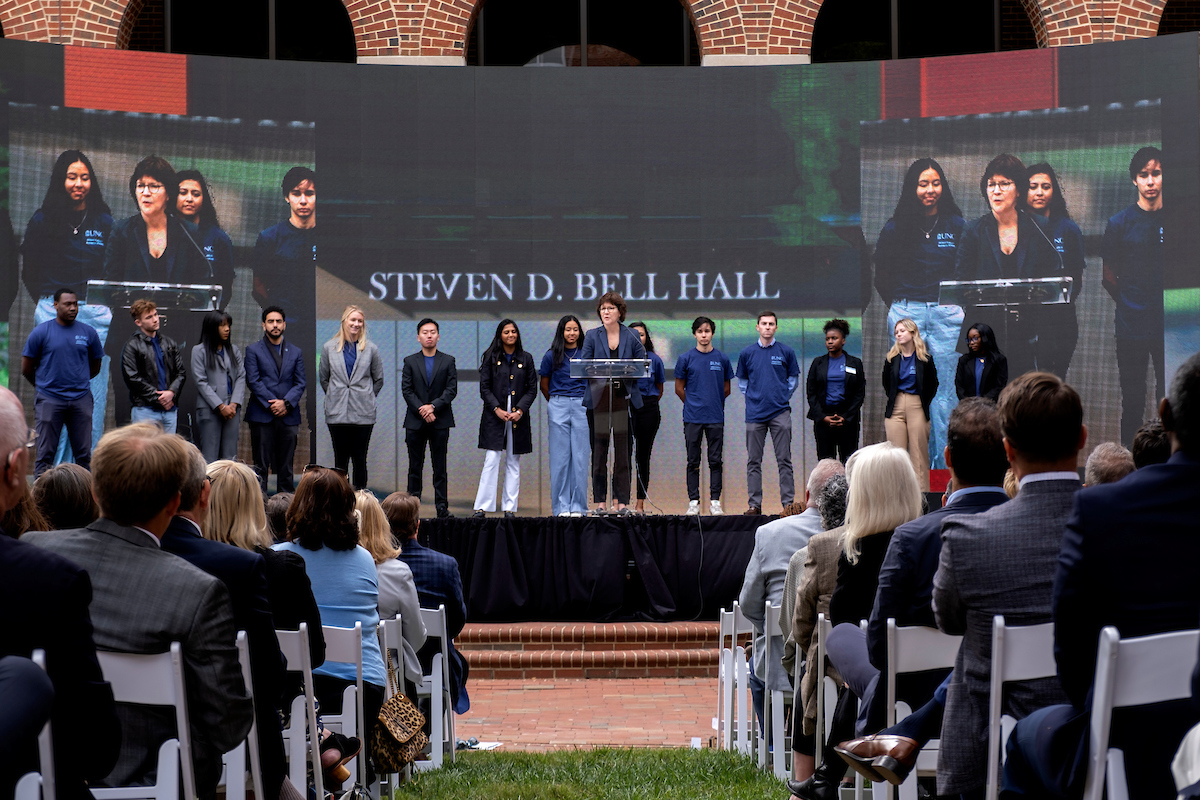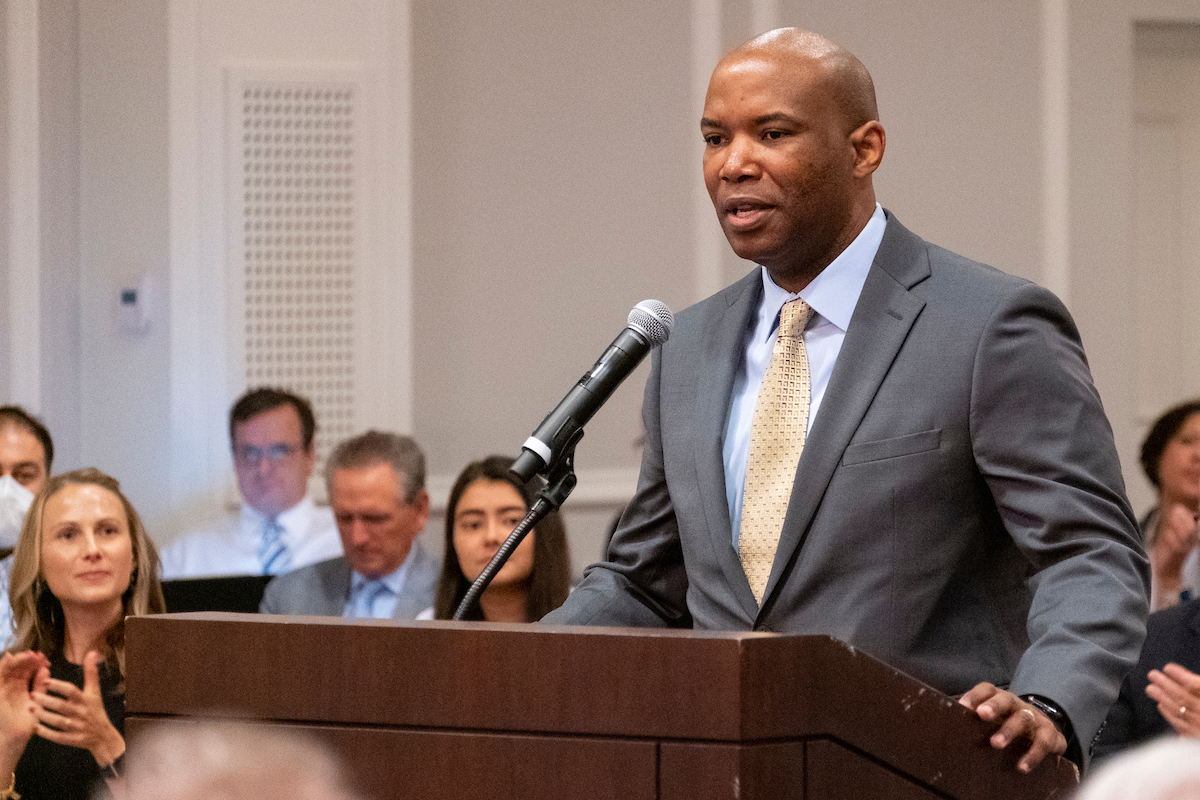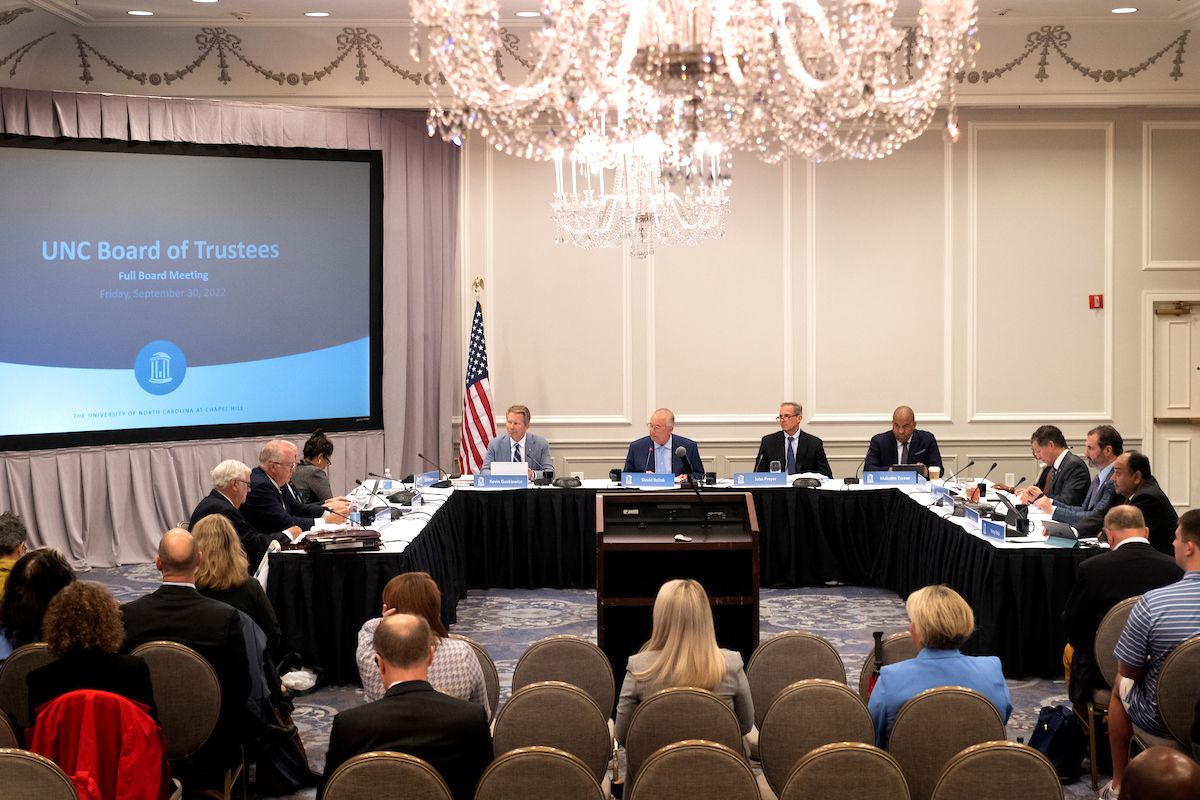Buildings, safety top BOT’s September agenda
Trustees celebrated a business school groundbreaking and heard about the University’s long-term approach to panhandling.

When Chancellor Kevin M. Guskiewicz describes Carolina’s readiness for future challenges as being “built for this,” sometimes he means it literally.
“We actually need to build to be ‘built for this,’ to provide our community with the facilities that they need to do their work,” Guskiewicz said in his remarks at the Sept. 30 meeting of the University Board of Trustees. “Our people are what make us shine, but the buildings, facilities and campus infrastructure are making a difference. State-of-the-art buildings help to attract talented people to this campus.”
As proof, he pointed to two campus events from the day before, the groundbreaking for Steven D. Bell Hall at the Kenan-Flagler Business School and the celebration of the 15th anniversary of the Fed Ex Global Education Center, “a gamechanger for this campus” that created space for the University to focus on its global mission, Guskiewicz said.
Carolina is counting on a similar impact from Bell Hall, the state-of-the-art building that will double the teaching space and enable a 50% increase in undergraduate enrollment in the business school. Of the $150 million needed to build Bell Hall and renovate the neighboring McColl Building, $75 million came from the N.C. General Assembly and $75 million was from private funding, including $25 million from Bell, an alumnus and chair emeritus of Bell Partners.
“We can never stop innovating, we can never stop building, and we can never stop setting the pace for all great universities,” said David L. Boliek Jr., chair of the Board of Trustees at the Bell groundbreaking ceremony, a highlighted event in the board’s two-day meeting schedule.

Kenan-Flagler Business School Interim Dean Jennifer Conrad closes the groundbreaking ceremony for Steven D. Bell Hall. (Jon Gardiner/UNC-Chapel Hill)
Safety concerns
In committee meetings and remarks from leadership, the University addressed a range of safety concerns, including complaints about panhandling on Franklin Street and new federal requirements for faculty regarding “conflicts of commitment.”

UNC Police Chief Brian James speaking to the Board of Trustees in May 2022. (Jon Gardiner/UNC-Chapel Hll)
Campus police recently joined their Chapel Hill counterparts in more patrols of Franklin Street, UNC Police Chief Brian James told members of the board’s Audit, Compliance and Risk Management Committee. But instead of arresting panhandlers, the police remain focused on connecting the individuals with the Street Outreach, Harm Reduction and Deflection program and the Campus and Community Coalition for the help they need.
Neither increased police presence nor cash for panhandlers is a solution, James said. “We are advising our students to please donate to organizations that contribute to the health of the unsheltered population,” he said. “Giving money directly to individuals only exacerbates the problem.”
Joy Bryde, institutional science and security officer, updated the committee on federal funding agencies’ increased focus on “undue foreign influence” and how that impacts the University and its researchers.
“For the most part our faculty are indeed doing what they need to do, but we need to support them and to limit their exposure, not just the University’s,” she said. One of her recommendations was the implementation of a campuswide online platform database for tracking faculty activity, originally proposed in 2017. “Right now our information is siloed.”
Money matters
In his presentation to the University Affairs Committee, Graduate Student Body President Theodore Nollert raised concerns that Carolina’s $17,000 minimum stipend for graduate students is the lowest among the University’s 15 peer institutions. It ranks 11th of 15 when adjusted as a nine-month income.

Theodore Nollert
“We suggest a target of $25,000 because that would move us from No. 11 on this list to No. 4,” Nollert said. Benefits of increasing the stipend include improving the University’s competitiveness with its peers and the ability to recruit students from underrepresented backgrounds.
In his remarks to the full board, Guskiewicz said that he was working with James White, dean of the College of Arts and Sciences, to address the graduate student stipend issue.
In other compensation-related issues, the board passed a package of items presented by Becci Menghini, vice chancellor for human resources and equal opportunity and compliance.
- Authorization for the chancellor and selected Tier I senior academic and administrative officers to participate in a deferred compensation and retirement program.
- Development of a program to provide sign-on, retention and/or performance bonuses for EHRA employees.
- Revision of salary ranges for School of Nursing faculty to “remain competitive in the market.”
The Budget, Finance, and Infrastructure Committee received updates on investments, fundraising and the budget.
- Despite recent downturns in the stock market, the Chapel Hill Investment Fund had a 4.4% return for fiscal year 2022, achieving a market value of $5.2 billion, reported Jonathon King, chief executive officer of UNC Management Company.
- As the Campaign for Carolina draws to a close at year’s end, Vice Chancellor for Development David Routh proposed keeping fundraising momentum going with a “Grand Challenges” drive focused on a limited number of strategic programs selected by the chancellor.
- Modest funding should be available for strategic investment in the budget for fiscal year 2024, predicted Nathan Knuffman, vice chancellor for finance and operations.

The UNC Board of Trustees met at the Carolina Inn on Sept. 30. (Jon Gardiner/UNC-Chapel Hill)
Academic freedom
In a follow-up to the resolution passed by the Board of Trustees in July affirming both freedom of speech and institutional neutrality, the Strategic Initiatives Committee heard an update from Christian Lundberg, vice provost for communication.
“This is not just a question of policy. This is a question of culture,” said Lundberg, who is also an associate professor in the College of Arts and Sciences’ communication department. Both the chancellor’s and provost’s offices are taking steps to develop that culture:
- Chancellor: planning a faculty committee for academic freedom and free expression that would be a source for advice, education and resources on academic freedom.
- Provost: fleshing out requirements for a “First Amendment Officer” function, reviewing internal processes for protecting faculty and student speech and building resources and support for faculty who feel that their speech has been chilled or threatened.
In other action, the trustees approved the following items:
- Requirement that trustees attend full board meetings in person to have their votes counted, a bylaws change initiated by the UNC System Board of Governors.
- Certification of compliance with the UNC System’s requirements for oversight of internal audit operations for fiscal year 2022.
- Resolution creating a task force on student career services and life skills programs.




